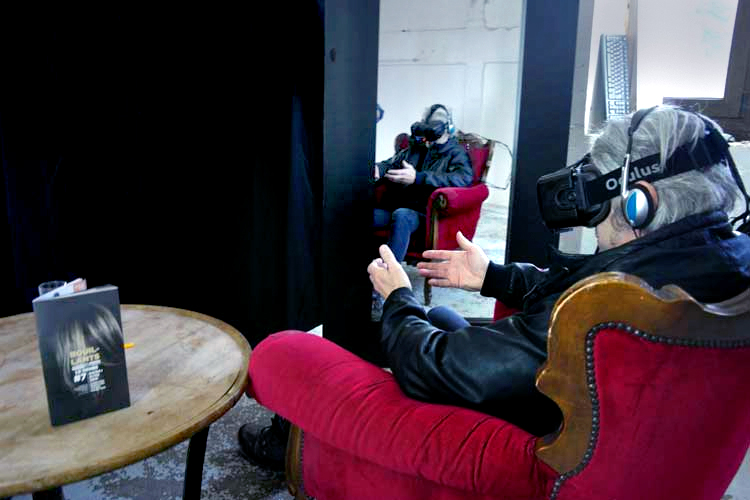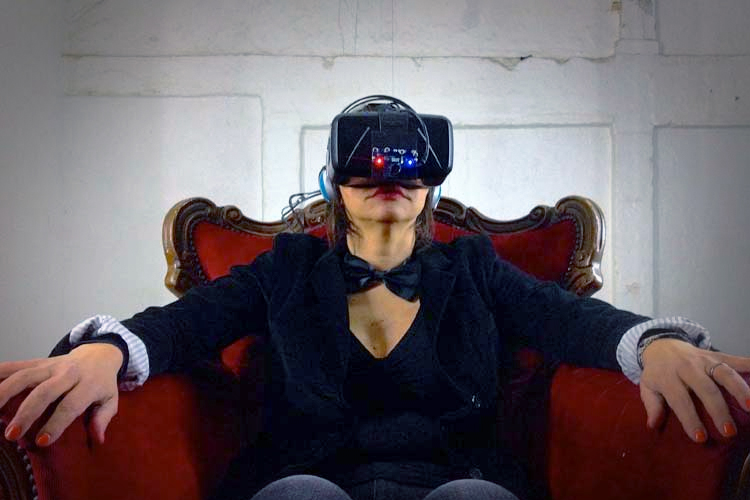The Machine To Be Another
Published 17 April 2015 by Laurent Catala
Presented at the Breton Bouillants festival, the “Machine To Be Another” from the international collective BeAnotherLab invites the user to a curious reflexive experience on the other person… and on oneself.
Vern-sur-Seiche, special envoy
Have you already thought about seeing the world through the eyes of close family or friends, in an immediate experience of consciousness transfer? The international collective BeAnotherLab invites you to experiment this rather peculiar process. BeAnotherLab is specialised in the setting up of interactions, playing with extending the body and the mind in its apparatus, “The Machine To Be Another”, currently presented at la Laiterie in Vern-Sur-Seiche, near Rennes, as part of the Bouillants festival (from the 4th of April until the 31st of May).
“The Machine to Be Another”, presentation video:
Initially, for those who ignore the technological as well as lo-fi approach of the collective, there is no indication of such an experience. The setting is indeed very simple, a thousand miles away from the high-tech nature of numerous augmented reality interfaces. From either side of a closed hanging curtain, two armchairs await their guests, with a simple mirror, a table and a few objects, close to each of them.

Only the presence of Oculus Rift virtual reality helmets on the armchairs set us thinking a little. The experience being held with two people, each one of the participants takes a seat, hanging curtain closed, and adjusts the famous helmet. Very quickly, a picture appears and one rapidly guesses it is not one’s own field of vision, but that of one’s partner.
Self-empathy
The effect, without strictly speaking being impressive, is startling due to the discrepancy between vision and gesture. Who encourages them? Are they one’s own or that of the other? A few minutes are necessary to get familiar with this progressive disembodiment. Because it is when the curtain is pulled, and that one is found literally faced with oneself, that the experience will find its most profound resonance, a kind of empathy with oneself in the end more curious than fun to experiment.

“Perceptive bugs”
“It is when he started a search on empathy that Philippe Bertrand, one of the members of the collective, discovered the experiences of the Ehrsson group at the Karolinska institute of Stockholm demonstrating that you can deceive the brain on the perception of the body in which it finds itself, with the help of cameras placed on a Barbie doll and virtual reality glasses”, explains Arthur Pointeau, member of BeAnotherLab. “ At the eventLAB of Barcelona, Mal Slater was able to demonstrate that using a person’s body whose skin colour was different could reduce the implicit bias that these people had towards others. We “hacked” these procedures to create an immersion in the body of someone else, by adding performative and narrative elements.”
The distinctive feature of the BeAnotherLab apparatus, that was in residence at the Barcelona Fab Lab and benefits from he support of MIT, undoubtedly lies in this notion of interference, of a bug between the physical environment and the potentiality of the experience it instils. “We are in fact using the environment in which we find ourselves instead of creating virtual environments”, says Alain Pointeau. “We use its physicality to be able to touch, grab, handle everything that surrounds us. We offer several perceptive bugs during the experience, one of which is to be able to shake one’s own hand from the perspective of someone else. By pulling the curtain open, one reveals the positioning of the system, a way to reflect upon yourself and the other person. We try to “force the empathy” of the participants’ brains.”
“The Machine To Be Another”, material development at the Barcelona FabLab (2014):
Obviously, reactions of people in front of their own vision perceived by an external source prove to be very variable.
“People are disorientated and/or enthusiastic. Sometimes they kiss without having exchanged a single word beforehand. The system anyhow clearly creates a feeling of closeness that can reveal itself uncomfortable, depending on the people going through the experience.”
Arthur Pointeau, BeAnotherLab
Their reactions allow us to nourish a project that still is in a development phase and open to anyone’s improvements. “The project is developed in open source, under a non commercial Creative Commons license, Sharealike, points out Arthur Pointeau. Our way of working consists in systematically meeting people to exchange views with them about the uses they are contemplating, about the way they would like to use the apparatus. We encourage them to take ownership of the system and take it in the direction they wish.”
“The Machine to be another” website
Bouillants, digital art and citizenship festival at Vern-sur-Seiche (near Rennes in France), from the 4th of April until the 31st of May, exhibition at la Laiterie, workshops, interventions at the multimedia library…
